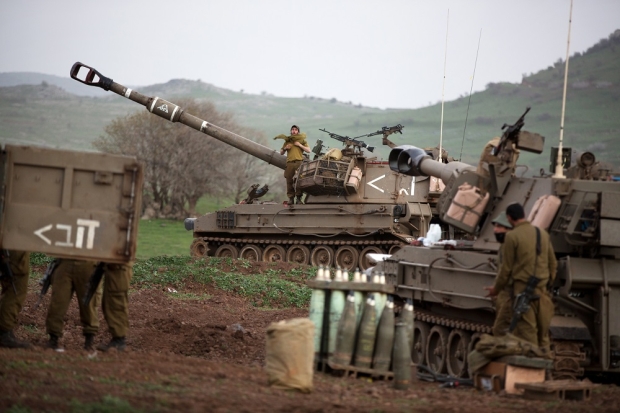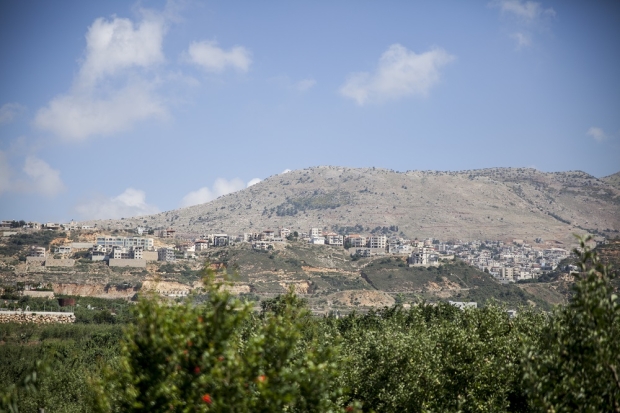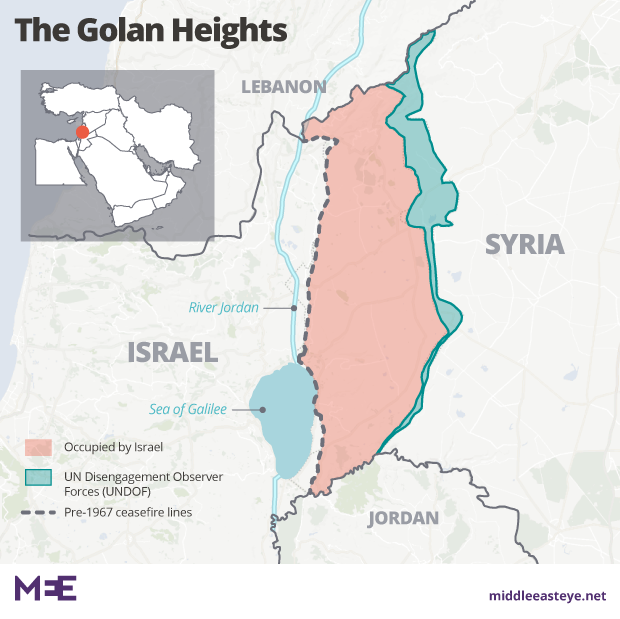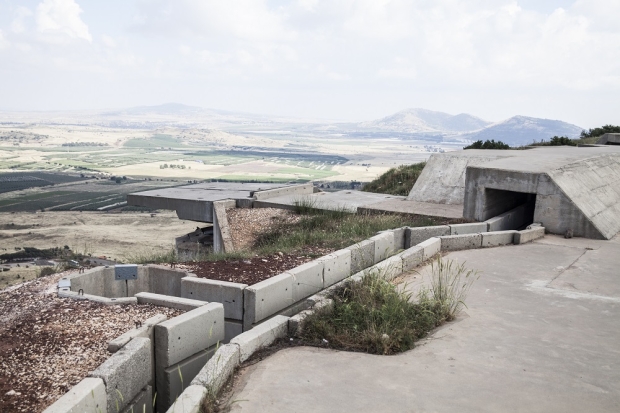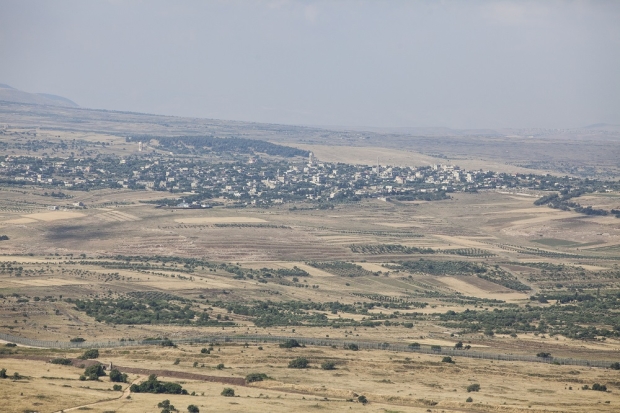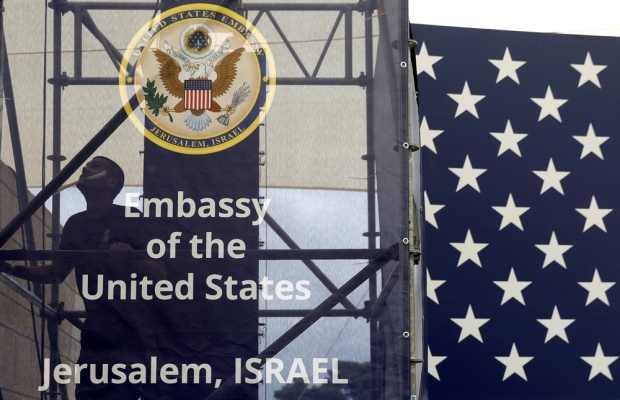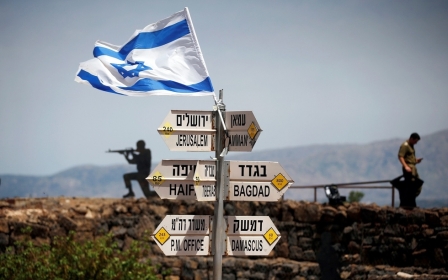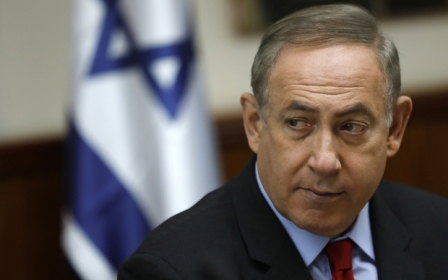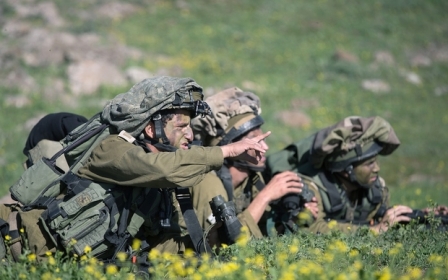Syrians in Golan 'paradise' caught between occupation and war
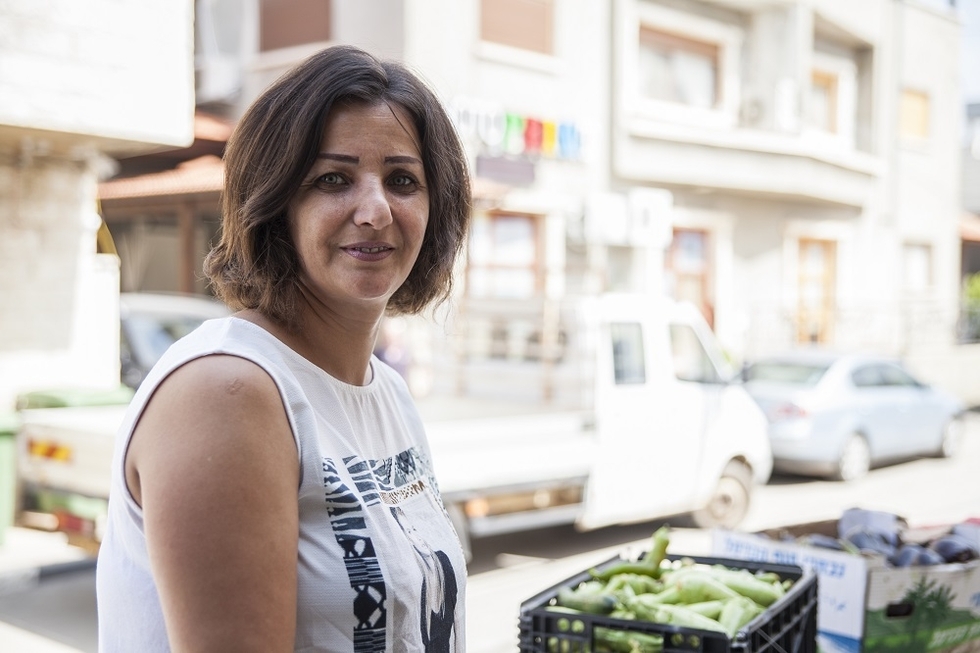
MAJDAL SHAMS, occupied Golan Heights - Driving to the Syrian Golan Heights, just over two hours northeast of Tel Aviv, the change in scenery signals the entrance into territory occupied by Israel since 1967.
The temperature drops as roads twist into mountain ranges, and the green landscape is amplified by the cherry and apple fields the region is known for.
During the war, known by some as the “Six-Day War” and fought between 5 and 10 June 1967, about 130,000 Syrians from the Golan Heights fled further into Syria as 340 villages and farms were demolished by Israeli forces.
We belong to Syria, we weren’t frightened by the [Israeli] soldiers
- Naseba Keesh Smara, Masaada resident
Each year on 5 June, Syrians mark their displacement from the Golan with Yom al-Naksa, Arabic for 'the Day of the Setback'. Palestinians observe the same anniversary, commemorating their forced expulsion from the West Bank, Gaza Strip and East Jerusalem.
Today, only one town and four villages remain: Majdal Shams, Buqatha, Masaada, Ein Qenyah and al-Gager, inhabited by approximately 25,000 locals.
In 1981, Israel controversially tried to force the Golan’s inhabitants to take Israeli citizenship, as the Israeli government attempted to annex the occupied territory in the face of international law and criticism.
Syrian labourers in Israel went on strike. Many of those who accepted the citizenship were then rejected by their communities.
The tensions reached boiling point in 1983, when 15,000 Israeli soldiers stormed the Golan villages and subjected them to a 43-day siege.
“The village was full of Israeli policemen with guns and weapons. They knocked on every door, they knew where everyone lived, they threw the passports inside and then shut the door,” Keesh Smara told Middle East Eye.
“We collected [the Israeli passports] from every two or three houses, went to the main square of Majdal Shams, threw them in the soldiers’ faces and ran back home. There were also some people who burnt them.”
Though she was 10 at the time, to this day it remains her conscious decision to reject Israeli identity.
“We belong to Syria, we weren’t frightened by the soldiers,” Keesh Smara said. “We felt like we would go back to Syria, it’s the place we belong to, not Israel.”
Her whole life, Keesh Smara has lived in hope the Golan Heights would be returned to Syria.
“I’ve never been able to visit Syria. It’s like a passion and a dream for me. I have many relatives over there who I want to see, to visit them in their houses and places. I feel my body belongs there.”
Before 2011, when the war broke out, Syrian youths from the occupied territory were able to study at universities in Damascus, which helped strengthen their identification with the country.
Apple trade
Israel also opened up the border two or three times a year for religious holidays, to allow pilgrimage.
Meanwhile, trade links also helped link the Golan to Syria - Damascus was the largest importer of Golani apples.
The ease of these communications was cut after the Syrian uprising, however.
Sitting among the cherry and apple fields lining the valley below Majdal Shams, the largest town in the occupied Golan, 25-year-old Naji Abu Saleh, told MEE the opportunity to study in Damascus helped him to understand his identity.“It felt like home,” Abu Saleh said. “You get excited, that’s how it felt. You discover a homeland, a new land, a forbidden land.”
It felt like home... You discover a homeland, a new land, a forbidden land
- Abu Saleh, on his first visit to Syria
Abu Saleh studied in the Syrian capital for eight months during 2010.
“It’s the biggest offer anyone ever had, to go from here to Syria," he said, adding that those who do so are able to connect with people of the same culture.
Wael Tarapieh, an artist and activist working with the Al-Marsad Arab Human Rights Centre in the Golan Heights, told MEE many people hoped there would be a change in Syria after the uprising in 2011.
They thought they would be able to “go back to Syria and live in a normal country”, Tarapieh said, sitting in his office in the mountains of Majdal Shams.
Tarapieh said the Golan youth were very active in protests at the beginning of the Syrian revolution, with enthusiasm dropping as it “turned into an ugly war”.
He believes young people started to lose hope in Syria, he said: “They started to think ‘how can I make my life better?’”
According to the activist, youths from the Golan began to mull the benefits of Israeli citizenship instead, such as the ease of travel.
Tarapieh said when the Syrian uprising turned into the destructive war we see today, there was an increase in the amount of people personally applying for Israeli citizenship.
According to Marsad, between 1982 and 2014 there was an average of 27 applications per year. In contrast, 2015 saw 105 applications and the next year 181.
Even so, to date, there are only 5,518 Syrians holding Israeli citizenship compared with 21,276 permanent residents. Those who only have residency status can access the social benefits of Israel, though they only hold a laissez-passer, which is most often given to stateless persons for international travel.
Abu Saleh applied for Israeli citizenship a year ago, “just to live normally, like any other citizen in Israel”.
He mentioned travel as his main motive. “When you’re travelling, you just get the flight and go, you don’t have to wait to go to the embassy,” he said.
Abu Saleh doesn’t want his father to find out he took Israeli citizenship.
“Because he will look at me like this...” he said, making a very disappointed face.
“My father would not like it, because he doesn’t like the government of Israel. I don’t feel I have to take it personally.”
Abu Saleh said holding Israeli citizenship would not change his identity.
“When I think of where I come from, I come from Golan, Majdal Shams, then I remember my father and grandfathers are Syrian.”
He does not believe identifying with something such as a county is a decision one makes. “It’s a feeling”, he said.
Yet Fady doesn’t seem to identify with any country, instead he feels more a “victim” of different nations’ “games”.
I don’t feel Syrian, I didn’t grow up there... I don’t feel Israeli. It’s a different culture
- Fady, Israeli citizen of Golan
“I don’t feel Syrian, I didn’t grow up there, I just heard about it and I heard a lot of stories about how the Syrian government treated the people before the revolution,” he told MEE.
“In the opposite, I don’t feel Israeli. It’s a different culture.”
'This is paradise'
Tarapieh from the Marsad Centre can understand Fady’s position.
“They [Golanis] are victims of big games between countries, and victims of illusions. They don’t hear anywhere about the history of this place, besides in their own home,” Tarapieh said.
Fady comes more from a position of survival and exhaustion from conflicts in the region, including recent escalations between Israel and Iran.
He said when explosions wake him up at night, such as during a recent flare-up on 10 May when Israel and Syria exchanged fire, he thinks he is lucky not to be on the Syrian side of the border.
“I’m born into this situation. To find a homeland, the first point is to be safe. I would absolutely be more safe in Israel than in Syria," he said.
“I’m not telling you the politics of Israel is good, but it’s more safe.”
Tarapieh expressed similar thoughts: “When everything is burning around them, this [Israel] is paradise.”
Tarapieh sees this as “political propaganda” alike to that of the US moving its embassy to Jerusalem.
“After the destruction and war in Syria, they think it’s time to take this step and use the Trump policy to recognise it is Israel,” he said.
“Syria needs decades to repair. As long as there is no democratic [government] there is no chance to get the Golan back.”
Syria needs decades to repair. As long as there is no democratic [government] there is no chance to get the Golan back
- Wael Tarapieh, Al-Marsad Arab Human Rights Centre
If the US was to support Israel in claiming sovereignty over the Golan Heights, Tarapieh does not predict there would be much uproar within the five remaining Syrian villages.
“When we talk about public space, it passed a dramatic change in the past six to seven years. Ten years ago, you could witness the celebration of the Independence of Syria - today, nothing,” he said.
“There is confusion because everyone is thinking of themselves and their future, but not of the society... That’s the problem with small societies like ours, without civil society, universities, political parties, which allow debate.”
For Keesh Smara, her fight and sense of belonging is still strong.
“Most people here, and I, would reject [the claim to sovereignty]. From our roots we feel against it,” she said.
However, Abu Saleh said it’s different for the younger generations.
He said there was no hope of fighting Israeli claims of sovereignty.
“The lands are now for the Israeli government. I hope sometime, even if we stay on the Israeli side, I hope to go there, even with a permit, for vacation or to work,” Abu Saleh said, referring to the Syrian villages that can be seen just across the border fence close to Majdal Shams.
“I really want peace.”
This article is available in French on Middle East Eye French edition.
Middle East Eye propose une couverture et une analyse indépendantes et incomparables du Moyen-Orient, de l’Afrique du Nord et d’autres régions du monde. Pour en savoir plus sur la reprise de ce contenu et les frais qui s’appliquent, veuillez remplir ce formulaire [en anglais]. Pour en savoir plus sur MEE, cliquez ici [en anglais].


